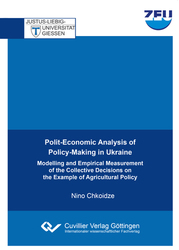| Departments | |
|---|---|
| Book Series (97) |
1381
|
| Nachhaltigkeit |
3
|
| Gesundheitswesen |
1
|
| Humanities |
2370
|
| Natural Sciences |
5407
|
| Mathematics | 228 |
| Informatics | 319 |
| Physics | 980 |
| Chemistry | 1364 |
| Geosciences | 131 |
| Human medicine | 243 |
| Stomatology | 10 |
| Veterinary medicine | 108 |
| Pharmacy | 147 |
| Biology | 835 |
| Biochemistry, molecular biology, gene technology | 121 |
| Biophysics | 25 |
| Domestic and nutritional science | 45 |
| Agricultural science | 1005 |
| Forest science | 201 |
| Horticultural science | 20 |
| Environmental research, ecology and landscape conservation | 148 |
| Engineering |
1798
|
| Common |
98
|
|
Leitlinien Unfallchirurgie
5. Auflage bestellen |
|
Advanced Search
Polit-Economic Analysis of Policy-Making in Ukraine (English shop)
Modelling and Empirical Measurement of the Collective Decisions on the Example of Agricultural Policy
Nino Chkoidze (Author)Preview
Extract, PDF (130 KB)
Table of Contents, PDF (69 KB)
The work analyses structural, institutional and political determinants of Ukrainian agricultural policy at the end of the 21st century’s first decade. Besides identifying the relevant actors in the policy domain and their interrelations, the study aims to shed light on preferences and general orientation about topical agricultural issues. The results differentiate between four ideological clusters preferring similar positions. Further objectives refer to the influence of institutional and structural factors on the determination of policy outcomes under different scenarios. To this end, the study not only deals with the constitutional order of the political system, in which decisions are formally adopted and implemented, but also with role and access structures of agricultural interest groups. The measured overall political control outflow from politicians to the interest groups amounts to 16.5%. Furthermore, the work econometrically examines the influence of special interests on agricultural trade policy formation and finds evidence that lower import-to-output ratios lead to higher protection levels in sectors dominated by commercial agriculture.
| ISBN-13 (Hard Copy) | 9783736997172 |
| ISBN-13 (eBook) | 9783736987173 |
| Final Book Format | A5 |
| Language | English, German |
| Page Number | 198 |
| Lamination of Cover | matt |
| Edition | 1. |
| Publication Place | Göttingen |
| Place of Dissertation | Gießen |
| Publication Date | 2018-01-23 |
| General Categorization | Dissertation |
| Departments |
Agricultural science
|
| Keywords | Agrarpolitik, Ukraine, Polit-ökonomische Analyse, Netzwerke, Agrarökonomische Transformation, Interessengruppen, Agrarhandelspolitik, Agricultural Policy, Ukraine, Political Economic Analysis, Networks, Agricultural Transformation, Interest Groups, Agricultural Trade Policy |








